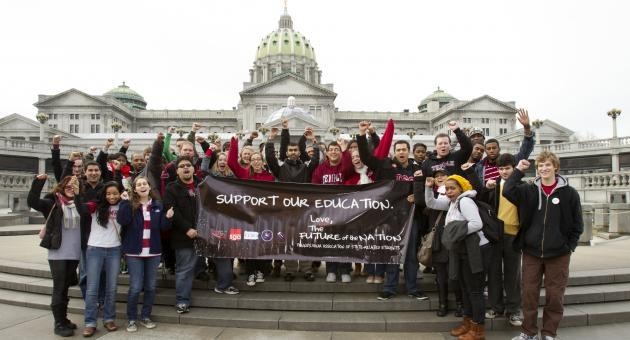Temple leaders, students appeal for funding in Harrisburg

Twice in the last two weeks, Temple's administration has met publicly with the General Assembly to make the case for a fair Commonwealth appropriation. Lending their voice to the effort have been nearly 6,000 Temple supporters who have contacted their legislators through TALON, the Temple Advocates Legislative Outreach Network.
A proposal by Gov. Tom Corbett to reduce the Commonwealth appropriation to Temple and other state-related schools by 30 percent would mean a boost in in-state tuition and hurt those students who can least afford to take on more debt. Corbett's proposal was part of his 2012-13 budget plan, announced in early February.
The latest appeal for Temple support came Feb. 29 before the state Senate Appropriations Committee. Anthony Wagner, Temple executive vice president, treasurer and CFO, said the relationship between the university and state has been valuable.
"Most importantly, this relationship has meant that Temple has been able to give our students access to a quality education," said Wagner, who noted that in-state students pay $10,000 less because of state support.
Committee Chairman Jake Corman, R-Centre County, has said he wants to restore the appropriations cut proposed by the governor. He noted that during the budget discussion, some have raised the prospect of the state-related schools becoming private, and Corman wanted to know what the impact would be on Temple.
"Temple does not want to be privatized," Wagner said emphatically. "We want to be public. We want to provide access. We do not want to walk away from this relationship."
There was strong support for Temple from the senators, including Sen. Vincent Hughes, D-Philadelphia. "Temple is a special place, an incredible gem," Hughes said during the hearing. "The crime of this (budget) proposal is that it threatens to put an education out of reach of so many people."
Hughes also decried the cuts that are proposed for health services and education provided by the Temple University Health System and Temple School of Medicine. Hughes asked Larry Kaiser what impact the budget would have on health services for the poor in Philadelphia. Kaiser is senior executive vice president for health sciences, dean of the Temple University School of Medicine and chief executive officer of the Temple University Health System.
"Our commitment is to take care of the people in the city of Philadelphia who can't go anywhere else," Kaiser said. "We have to do this, even though we are already down $22 million in this year's budget and will be down between $37 million and $40 million in the coming year."
President Hart makes the case for state support
The venue was different one week earlier, when the leaders of Temple, Penn State University, the University of Pittsburgh and Lincoln University, spoke before the House Appropriations Committee.
Hart told legislators that the cuts represent a significant portion of Temple’s operating budget for its university enterprise.
If approved, the Commonwealth appropriation for Temple would be reduced by nearly $42 million to approximately $98 million. Taking into account the 19 percent reduction in the current fiscal year, plus a 5 percent "freeze" imposed by the governor in January, Temple's Commonwealth appropriation will fall by about 50 percent over two years, if the governor's plan is approved by the General Assembly.
In responding to questions, Hart told House members that if the university tried to make up for the lost Commonwealth support through tuition alone, it would mean a substantial increase, especially for in-state students. While Temple would not take that route, Hart said any large increase in tuition would "have a disproportionate impact on disadvantaged students and their families."
All the presidents said the cuts would also hurt the communities where they are located, and where they serve as economic powerhouses. Temple is responsible for $6.2 billion in economic impact to the Commonwealth and 72,000 jobs statewide. In Philadelphia alone, Temple's economic impact is $3.7 billion and 34,000 jobs.
Students, parents, employees and alumni urged to Stand With Temple
The House appearance followed a response by President Hart when the governor's budget was announced on Feb. 7. In a video released immediately after Corbett's announcement, Hart said that the impact would be widespread if the Commonwealth appropriation is reduced as he recommends.
"We understand that the Commonwealth is facing difficult budget decisions. As the state has struggled through a challenging economy, Temple has responded by cutting millions from its operating budget, streamlining processes, eliminating redundancies and reducing administrative staff," Hart said in a video response to the governor's address.
"I urge you to let your legislators know how vital their support is for schools like Temple. The best way to make your voices heard is through TALON, the Temple Advocates Legislative Outreach Network," said the president.
Students have already been active in the effort. On Jan. 29, Temple students joined their peers from Penn State, University of Pittsburgh and Lincoln University in encouraging state legislatures to avoid cutting state-funding for higher education. More than 170 students, with 53 representing Temple, attended the rally in the rotunda of the Capitol Building in Harrisburg.